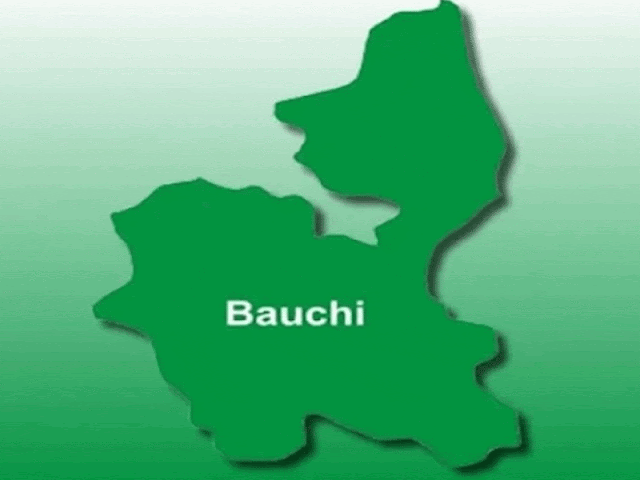Bauchi, Nigeria – September 2025
In a significant development aimed at curbing systemic inefficiencies and financial leakages in Nigeria’s public sector, the Bauchi State Government has uncovered approximately 100 ghost workers within its health sector workforce. This revelation, which has sent ripples across the state’s administrative and public circles, underscores the persistent challenge of payroll fraud in Nigeria’s civil service. The state government has pledged to impose severe sanctions on those found complicit in the scheme, signaling a renewed commitment to transparency, accountability, and fiscal responsibility in governance.
The discovery was made during a comprehensive staff verification exercise initiated by the Bauchi State Ministry of Health in collaboration with the Office of the Head of Civil Service. The exercise, designed to sanitize the state’s payroll system and ensure that public funds are utilized efficiently, revealed that individuals who were either non-existent or no longer actively employed were still receiving salaries, costing the state millions of naira annually. This development has sparked widespread discussions about the broader implications for governance, public trust, and the delivery of essential services in Bauchi State.
Background: The Menace of Ghost Workers in Nigeria
The issue of ghost workers—fictitious or inactive employees listed on government payrolls—has long plagued Nigeria’s public sector, draining resources that could otherwise be channeled into critical areas such as healthcare, education, and infrastructure. Across the country, state and federal governments have periodically uncovered such fraudulent practices, often attributing them to weak oversight, outdated payroll systems, and complicity among civil servants and administrators. The financial implications are staggering, with estimates suggesting that ghost workers cost Nigeria billions of naira annually, exacerbating budgetary constraints and undermining development efforts.
In Bauchi State, located in Nigeria’s northeastern region, the challenge of ghost workers is particularly acute given the state’s limited resources and the pressing need to address developmental challenges, including high poverty rates, inadequate healthcare infrastructure, and low literacy levels. The health sector, which serves as a lifeline for millions of residents, has been especially vulnerable to inefficiencies, with ghost workers contributing to inflated wage bills and diverting funds from patient care and facility upgrades.
The recent discovery of 100 ghost workers in Bauchi’s health sector is not an isolated incident but part of a broader pattern of payroll irregularities that successive administrations have sought to address. Previous verification exercises in Bauchi and other states have exposed similar issues, yet the persistence of ghost workers highlights the need for more robust and sustained reforms to tackle the root causes of the problem.
The Verification Exercise: Unearthing the Fraud
The Bauchi State Government’s latest staff verification exercise was launched as part of a broader initiative to streamline public sector operations and ensure that resources are allocated efficiently. The exercise involved a meticulous review of payroll records, physical verification of employees, and cross-referencing data with biometric and bank verification number (BVN) systems to authenticate the identities of workers. The process was spearheaded by a joint committee comprising representatives from the Ministry of Health, the Office of the Head of Civil Service, and other relevant agencies.
According to a statement from the Bauchi State Government, the verification exercise was prompted by concerns over discrepancies in payroll records and reports of irregularities in the health sector. The committee employed a multi-pronged approach, including physical headcounts at health facilities, scrutiny of attendance registers, and validation of employee credentials. The process also involved collaboration with financial institutions to verify salary payments and ensure that funds were being disbursed to legitimate employees.
The findings of the exercise were alarming: approximately 100 individuals listed on the health sector payroll were identified as ghost workers. These individuals either did not exist, had left the service due to retirement, resignation, or death, or were otherwise unaccounted for during the verification process. The discovery has raised serious questions about the integrity of the state’s payroll management system and the oversight mechanisms in place to prevent such fraud.
Financial and Operational Implications
The presence of ghost workers in Bauchi’s health sector has significant financial and operational consequences. Financially, the state has been losing millions of naira monthly to salaries paid to non-existent or inactive workers. These funds, if recovered, could be redirected to address critical gaps in the health sector, such as procuring essential medical equipment, hiring qualified personnel, or upgrading dilapidated health facilities. For a state like Bauchi, where healthcare access remains a challenge for many residents, particularly in rural areas, the misallocation of resources due to ghost workers represents a significant setback to development goals.
Operationally, the existence of ghost workers undermines the efficiency and effectiveness of the health sector. With fewer active workers than indicated on the payroll, health facilities may be understaffed, leading to overworked employees, longer patient wait times, and compromised quality of care. The revelation also raises concerns about the accuracy of workforce planning and the ability of the state to meet its healthcare delivery targets.
The Bauchi State Government has estimated that the ghost worker scheme has cost the state tens of millions of naira over the years, though exact figures are yet to be disclosed pending a full audit. The financial hemorrhage underscores the urgency of addressing payroll fraud and implementing measures to prevent its recurrence.
Government’s Response: Sanctions and Reforms
In response to the findings, the Bauchi State Government has vowed to take decisive action against those responsible for the ghost worker scheme. The state’s Head of Civil Service, Alhaji Yahuza Adamu, stated that individuals found complicit in the fraud, including supervisors, payroll officers, and other accomplices, will face severe sanctions. These sanctions could include dismissal, prosecution, and recovery of funds illicitly obtained through the scheme. The government has also pledged to strengthen internal controls to prevent future occurrences of payroll fraud.
Governor Bala Mohammed, who has made transparency and accountability cornerstones of his administration, reiterated his commitment to rooting out corruption in the public sector. In a press briefing, the governor emphasized that the verification exercise was part of a broader agenda to reform the state’s civil service and ensure that public funds are used judiciously. “We cannot allow a few individuals to siphon resources meant for the development of our people,” he said. “Those found guilty will face the full wrath of the law.”
To address the systemic issues exposed by the ghost worker scandal, the state government has outlined several measures. These include:
Digitalization of Payroll Systems: The government plans to fully automate the payroll system, integrating biometric verification and BVN authentication to ensure that only legitimate employees receive salaries. This move is expected to reduce human interference and minimize opportunities for fraud.
Regular Audits and Verification: The state intends to conduct periodic staff verification exercises to ensure that payroll records remain accurate and up-to-date. These audits will be complemented by unannounced inspections at health facilities to verify employee presence and performance.
Capacity Building for Administrators: To address lapses in oversight, the government will invest in training for payroll officers, supervisors, and other administrators to enhance their skills in financial management and fraud detection.
Public Awareness Campaigns: The state plans to engage citizens in the fight against payroll fraud by encouraging whistleblowing and providing channels for reporting suspicious activities. This initiative aims to foster a culture of accountability and deter potential perpetrators.
Collaboration with Anti-Corruption Agencies: The Bauchi State Government has indicated its willingness to work with agencies such as the Economic and Financial Crimes Commission (EFCC) and the Independent Corrupt Practices and Other Related Offences Commission (ICPC) to investigate and prosecute those involved in the ghost worker scheme.
Broader Context: Challenges in Nigeria’s Health Sector
The discovery of ghost workers in Bauchi’s health sector is a microcosm of the broader challenges facing Nigeria’s public health system. Despite being one of Africa’s largest economies, Nigeria struggles with a healthcare system that is underfunded, understaffed, and plagued by inefficiencies. According to the World Health Organization, Nigeria’s health expenditure per capita is among the lowest in the world, with significant disparities in access to care between urban and rural areas.
In Bauchi State, these challenges are compounded by geographic and socio-economic factors. The state’s predominantly rural population faces barriers to healthcare access, including long distances to facilities, inadequate infrastructure, and a shortage of skilled healthcare professionals. The presence of ghost workers exacerbates these issues by diverting resources that could be used to address these gaps.
The ghost worker phenomenon is not unique to Bauchi. In recent years, states such as Kaduna, Kano, and Edo have reported similar issues, with verification exercises uncovering thousands of ghost workers across various sectors. These discoveries have prompted calls for nationwide reforms to modernize payroll systems, strengthen oversight, and promote accountability in the public sector.
Public Reaction and Calls for Accountability
The revelation of ghost workers in Bauchi’s health sector has elicited strong reactions from residents, civil society organizations, and stakeholders in the state. Many have expressed outrage at the scale of the fraud and its impact on the delivery of essential services. Civil society groups, such as the Bauchi State chapter of the Nigerian Medical Association (NMA), have called for a thorough investigation and swift prosecution of those involved.
Residents of Bauchi have also voiced their concerns about the state of the health sector. Aishatu Musa, a nurse at a primary health center in Bauchi, lamented the impact of understaffing on service delivery. “We are overworked because the actual number of workers is far less than what is on paper,” she said. “This fraud is affecting our ability to care for patients effectively.”
Public discourse on platforms like X has highlighted the need for systemic reforms to address payroll fraud. Users have called for greater transparency in government operations and the adoption of technology to prevent similar scandals in the future. Some have also urged the government to prioritize the welfare of legitimate workers and invest in improving healthcare infrastructure.
The Way Forward: Building a Transparent and Efficient System
The Bauchi State Government’s discovery of 100 ghost workers in the health sector serves as a wake-up call for stakeholders at all levels of government. While the verification exercise is a step in the right direction, sustained efforts are needed to address the root causes of payroll fraud and restore public trust in governance.
Experts suggest that a multi-faceted approach is required to tackle the ghost worker problem. This includes investing in technology to modernize payroll systems, strengthening institutional frameworks to enhance oversight, and fostering a culture of accountability among public servants. Additionally, engaging citizens in governance processes and encouraging whistleblowing can help deter fraudulent practices.
For Bauchi State, the path forward involves not only addressing the immediate fallout from the ghost worker scandal but also implementing long-term reforms to improve the efficiency and effectiveness of the health sector. By redirecting recovered funds to critical areas such as staff training, facility upgrades, and medical supplies, the state can make significant strides toward achieving its healthcare goals.
Conclusion
The uncovering of 100 ghost workers in Bauchi’s health sector is a stark reminder of the challenges facing Nigeria’s public sector. While the discovery highlights systemic weaknesses in payroll management and oversight, it also presents an opportunity for meaningful reform. The Bauchi State Government’s commitment to imposing sanctions and implementing corrective measures is a positive step, but the success of these efforts will depend on their consistent and transparent execution.
As Bauchi moves to address this scandal, the lessons learned can serve as a blueprint for other states grappling with similar issues. By prioritizing accountability, leveraging technology, and engaging citizens, Nigeria can build a public sector that is transparent, efficient, and responsive to the needs of its people. For now, the people of Bauchi await the government’s next steps, hoping that this moment marks a turning point in the fight against corruption and inefficiency in the state’s health sector.






